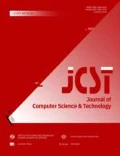Abstract
Recommender systems (RS) have been found supportive and practical in e-commerce and been established as useful aiding services. Despite their great adoption in the user communities, RS are still vulnerable to unscrupulous producers who try to promote their products by shilling the systems. With the advent of social networks new sources of information have been made available which can potentially render RS more resistant to attacks. In this paper we explore the information provided in the form of social links with clustering for diminishing the impact of attacks. We propose two algorithms, CluTr and WCluTr, to combine clustering with \trust" among users. We demonstrate that CluTr and WCluTr enhance the robustness of RS by experimentally evaluating them on data from a public consumer recommender system Epinions.com.
Similar content being viewed by others
References
Lam S K, Riedl J. Shilling recommender systems for fun and profit. In Proc. the 13th International Conference on World Wide Web (WWW), May 2004, pp.393-402.
Mehta B. Unsupervised shilling detection for collaborative filtering. In Proc. the 22nd National Conference on Artificial Intelligence, Jul. 2007, pp.1402-1407.
Mobasher B, Burke R D, Sandvig J J. Model-based collaborative filtering as a defense against profile injection attacks. In Proc. the 21st National Conference on Artificial Intelligence, Jul. 2006, pp.1388-1393.
Su X F, Zeng H J, Chen Z. Finding group shilling in recommendation system. In Special Interest Tracks and Posters of the 14th WWW, May 2005, pp.960-961.
Zhang S, Chakrabarti A, Ford J, Makedon F. Attack detection in time series for recommender systems. In Proc. the 12th ACM SIGKDD International Conference on Knowledge Discovery and Data Mining, Aug. 2006, pp.809-814.
DuBois T, Golbeck J, Kleint J, Srinivasan A. Improving recommendation accuracy by clustering social networks with trust. In Proc. ACM Workshop on Recommender Systems & the Social Web, Oct. 2009.
Sarwar B M, Karypis G, Konstan J, Riedl J. Recommender systems for large-scale e-commerce: Scalable neighborhood formation using clustering. In Proc. the 5th Int. Conf. Computer and Information Technology, Dec. 2002.
Pitsilis G, Zhang X L, Wang W. Clustering recommenders in collaborative ¯ltering using explicit trust information. In Proc. the 5th IFIP WG 11.11 International Conference on Trust Management (IFIPTM), Jun. 2011, pp.82-97.
Truong K Q, Ishikawa F, Honiden S. Improving accuracy of recommender system by item clustering. Transactions on Information and Systems, 2007, E90-D(9): 1363–1373.
O’Connor M, Herlocker J. Clustering items for collaborative filtering. In Proc. SIGIR 2001 Workshop on Recommender Systems, Sept. 2001.
O’Donovan J, Smyth B. Trust in recommender systems. In Proc. the 10th International Conference on Intelligent User Interfaces, Jan. 2005, pp.167-174.
Marsh S P. Formalising trust as a computational concept [Ph.D. Thesis]. University of Stirling, Apr. 1994.
Mobasher B, Burke R, Bhaumik R, Williams C. Effective attack models for shilling item-based collaborative filtering systems. In Proc. WebKDD Workshop, Aug. 2005.
Mobasher B, Burke R, Bhaumik R, Williams C. Toward trustworthy recommender systems: An analysis of attack models and algorithm robustness. ACM Trans. Internet Technol., Oct. 2007, 7(4): Article No.23.
Cheng Z P, Hurley N. Effective diverse and obfuscated attacks on model-based recommender systems. In Proc. the 3rd ACM Conf. Recommender Systems, Oct. 2009, pp.141-148.
Cheng Z P, Hurley N. Robustness analysis of model-basedcollaborative filtering systems. In Proc. the 20th Irish Conf. Artificial Intelligence and Cognitive Science, Aug. 2009, pp.3-15.
Ziegler C, Lausen G. Analyzing correlation between trust and user similarity in online communities. In Proc. the 2nd Int. Conf. Trust Management, May 2004, pp.251-265.
Jamali M, Ester M. TrustWalker: A random walk model for combining trust-based and item-based recommendation. In Proc. the 15th ACM SIGKDD Int. Conf. Knowledge Discovery and Data Mining, Jun. 2009, pp.397-406.
Massa P, Avesani P. Trust-aware recommender systems. In Proc. the 1st ACM Conference on Recommender Systems, Oct. 2007, pp.17-24.
Ma H, King I, Lyu M R. Learning to recommend with social trust ensemble. In Proc. the 32nd Int. ACM SIGIR Conf. Research and Develop. in Inform. Retrieval, Jul. 2009, pp.203-210.
Ma H, Lyu M R, King I. Learning to recommend with trust and distrust relationships. In Proc. the 3rd ACM Conference on Recommender Systems, Oct. 2009, pp.189-196.
Arthur D, Vassilvitskii S. k-means++: The advantages of careful seeding. In Proc. the 18th Annual ACM-SIAM Symposium on Discrete Algorithms, Jan. 2007, pp.1027-1035.
Rodgers J, Nicewander A. Thirteen ways to look at the correlation coefficient. The American Statistician, 1988, 42: 59–66.
Author information
Authors and Affiliations
Corresponding author
Additional information
The preliminary version of the paper was published in the Proceedings of EDB2012.
Electronic Supplementary Material
Below is the link to the electronic supplementary material.
Rights and permissions
About this article
Cite this article
Zhang, XL., Lee, T.M.D. & Pitsilis, G. Securing Recommender Systems Against Shilling Attacks Using Social-Based Clustering. J. Comput. Sci. Technol. 28, 616–624 (2013). https://doi.org/10.1007/s11390-013-1362-0
Received:
Revised:
Published:
Issue Date:
DOI: https://doi.org/10.1007/s11390-013-1362-0




